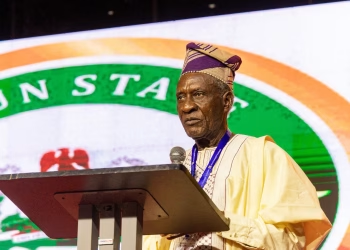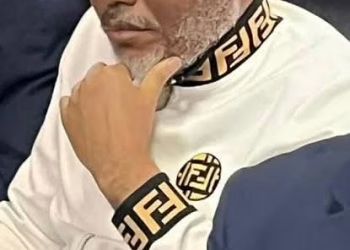By Richard Adeyinka
Oludare Alaba made news recently when he returned the degree certificate issued to him by Ladoke Akintola University of Technology (LAUTECH), Ogbomoso and demanded a refund of his school fees, seven years after graduation.
According to him, he studied Agricultural Extension and Rural Development at the institution, but since graduation, his degree certificate has been of no value to him. He could not secure job with it. All his efforts proved abortive.
He once went into farming with an elderly man briefly in Kwara State. Still, no solution. He even sold ponmon (cow skin) during his NYSC. Yet, no solution. Some people wanted to lure him into acquiring some metaphysical powers that will “open doors” for him. But he turned them down so he could be useful to himself, his family, Nigeria and God.
His plan is to be an entertainer and since his father could not help him financially, he feels his school fees in LAUTECH should help if he could get a refund. That is daring and unprecedented.
The body language, utterances and conduct of Oludare suggest he is feeling let down and frustrated by his former university, his education, his government and his country. It is easy to see that his initial plan was to attend a university, get certificate, secure a job and live happily ever after.
But unfortunately the plan has not materialised so far. He is therefore frustrated and angry but justifiably so. I will not blame him. Frustration can force a man to do just about anything.
In 1959, there was unemployment in South West Nigeria among school leavers. Secondary school leavers were asked to apply for jobs. In response, 596 Secondary Modern School leavers applied through the Western Regional Employment Bureau.
For two years, only 36 of 596 applicants, representing 6%, were placed on jobs. Similarly, 1,467 Secondary Grammar School leavers also applied within the same period and only 501, representing 34.1%, were placed on jobs.
It led to agitations among the school leavers, as high hopes offered by the free education policy, were dashed. In its editorial, the Catholic Independent newspaper of January 1961 lamented that the situation was “bare facts of an ever-increasing problem facing the mass of school leavers in Western Nigeria. An ever-increasing problem.”
Like Oludare, school leavers couldn’t it take anymore, they confronted government officials of the Western Region. Chief Akin Deko, the Minister for Agriculture, addressed the school leavers and told them that “hardly any service job exists for Secondary Modern School leavers because they cannot compete for few jobs there are with Secondary Grammar School leavers.
“People should not blame the government officials because they simply cannot create jobs that don’t exist. People who need jobs should approach private companies but they will need to know someone who will connect them to people in those private firms.”
This was in 1961, the era people usually refer to as Nigeria’s glorious period. But what were job seekers told to do? Don’t look at government to provide jobs. Government can’t create jobs that are not there. Chief Akin Deko was bold enough to say it. Today, even when that is a fact, no government official or politician is bold enough to say it.
Young people, especially graduates, always look towards government for jobs. Majority of them hardly think of creating jobs. It is a thinking that has been with us for a long time.
Our education is structured to make us think as job seekers and not job creators.
There are organisations that are teaching graduates how to have beautiful Curriculum Vitae (CV) but none for teaching them how to have beautiful business ideas that they can develop after leaving school. That is what Oludare’s case has shown.
Oludare studied Agricultural Extension and Rural Development. But it looks like it was an afterthought. He studied it as an end and not as a means to an end. He studied it in order to acquire certificate to get job in other areas/fields like many graduates.
But what is Agricultural Extension that Oludare studied? According to Federal College of Land Resources Technology, Owerri, Agriculture Extension is a “service or system which assists farm people, through educational procedures, in improving farming methods and techniques, increasing production efficiency and income, bettering their levels of living, and lifting the social and educational standards of rural life.”
Extending the definition further, the International Food Policy Research Institute says it is a system that “plays a crucial role in boosting agricultural productivity, increasing food security, improving rural livelihoods, and promoting agriculture as an engine of pro-poor economic growth.”
Like many other students, what could be the problem with Oludare that he couldn’t see opportunity in the knowledge he has acquired either in Agricultural Sciences and Rural Development or in other areas and kick start his life journey after graduation? Is it possible that he wasn’t taught to see opportunities in this field and other field that he can develop further capacity in or it is a problem of inability to think beyond the classroom?
University education is meant to equip one with more than one skillset.
But seldom see that in our graduates. Experts such as Ann Margaret Sharp (2006), Hart (2013) and Teneva (2015) felt that proper education will lead to the development of an autonomous person who has the ability to think well and to think for him or herself about matters of importance and a necessity for the development and self-realization of the individual. Its quality and efficiency depend not only on the prosperity of the individual, but also the quality of life and the progress of the whole society. This is not what we have today in many of those who acquire university education. The definition university education has changed, so also is its essence.
The output has been disappointing.
In 2017, an organisation approached my organisation to organise a training for Lagos farmers in hydroponic farming. I went to FUNAAB to meet experts on the training. I met Professor Ariyo of the Department of Plant Breeding and Seed Production and he did an excellent job of putting the proposal together.
Although the training did not take place eventually, my meeting with Professor Ariyo opened my eyes to many opportunities in our agricultural space and what our universities of agriculture are doing. Unfortunately, the knowledge they produce is not being put to use by a nation battling food insecurity. If it had taken place, the training would have, among other things, increased the knowledge of the participants (farmers) on the importance of off-season cultivation of some crops, especially horticultural under sustainable intensive crop production system.
It would have also familiarised the participants (farmers) with the skills and knowledge required in the operation of hydroponics. This is part of what someone who studied Agricultural Extension and Rural Development should be doing. But it appears to me that the knowledge and its marketing is lost somewhere.
Many Nigerian graduates assume wrongly that certificate is the sole purpose of acquiring university education. For them, it is neither about knowledge nor personal development and self-realisation/actualisation. It is about that paper certificate.
As a university teacher, I know the thinking of an average student in our universities nowadays. If it is possible to get that certificate at the point of registration as “freshers”, without attending classes, they don’t mind. That attitude has found its way into our street lingo. It is will be rare not to have come across a statement like “Who education epp?”
Femi Kusa, the former editor of The Guardian newspaper, referred to it as the misconception of education. In his recent article titled “Ebenezer Obey: Disappointing sons of eminent fathers”, Femi Kusa said: “The conception of education is misunderstood and children and adults alike are miseducated about themselves and the world in which they live. Since they cannot understand themselves and the world, and since the world will not yield way for them, they must totter and fall or crash.”
Both students and educators in this country are guilty of this. Femi Kusa argued that “Educators have been educating only the intellect and not the “owner” of the intellect.
The curricular do not recognise an owner of the intellect or believe that this owner exists. Thus, from about the age of three years, the intellect is sent to teachers at school for sharpening in a system which shuts out the owner. Yet the owner is the Living Essence who speaks of “my Brain” or “my hand” or my “teeth” or “my intellect”.
This misconception has been extended to free education programmes of government. With free education, students in public universities think they must not only pay fees, they also must not buy textbooks, let alone read.
Because of this, the bookshops in many of these universities sell primary and secondary school textbooks as well as “inspirational textbooks” written by pastors and motivational speakers than academic textbooks.
Martins Oloja, Managing Director and Editor-in-Chief of The Guardian, alluded to this, while relating his experience during his visit to the University of Lagos in 2016. He had “depression” after visiting the university bookshop for two and half hours but could only find primary and secondary school books than those for university students.
Because students don’t buy books, it will be foolish for bookshops to store them. If students don’t read books in support of their course of study, how will they become knowledgeable enough to function in this 21st century economy after graduation? They rely mostly on what the lecturers will say in class. If lecturers give assignment, only few of them will genuinely do it.
American President Harry S. Truman succinctly captured it when he said that although not all readers are leaders, but all leaders are readers. Another famous quote says those who can read but do not read have no advantage over those who cannot read.
Our students must prepare better for life after school. They must develop themselves beyond the level they are currently. They must buy and read scholarly books and journals in their respective fields. They must read, read and read.
They must be ready for when any opportunity may knock. I am not saying here that Oludare did not prepare or did not read. But if I am to recruit for my firm, I am not sure I will be encouraged to employ him from what I saw. That is not to say others won’t find him good enough.
However, the Alumni Association of LAUTECH has come to his rescue as one of their own. The executives of the association have raised ₦500,000 for him to buy what he needs for his entertainment plans. He has in turn bought a laptop and phone among others with the money. He is ready to go into entertainment. May he find success.
Adeyinka is the Chairman/CEO of Data Home Research and Communication Limited





